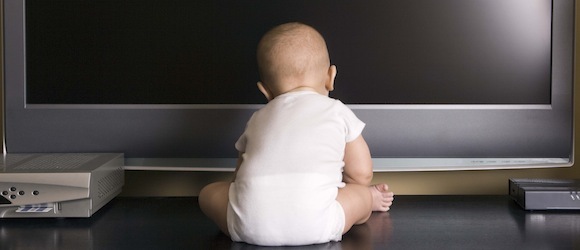
No Television for Children Under Two Years Old?
I can not tell a lie. Occasionally, under the age of two, my children watched television.
I have every well-used excuse in the book: it was 30 years ago and the research then was much less definitive to the research today, they watched just at dinner time to help me with crankiness, my husband travelled a lot or was often home late. I was exhausted and needed help, Sesame Street was a learning experience…don't you know!
It all worked for me then, but now as a semi-retired grandmother who has more time and usually more patience, I want to do the right thing by my grandsons. When I started researching on the internet regarding this topic, the opinions were plentiful, passionate and confusing. A great deal of research has been done on the effects of television on children’s lives. The first step in making good decisions is to get the facts.
These facts rang true for me.
- The first 2 years of life are considered a critical time for brain development. TV and other electronic media can get in the way of exploring, playing, and interacting with parents and others, which encourages learning and healthy physical and social development.
- As far as learning goes, children two and under see television as a confusing jumble of colors, images and noises and won't understand much of the content they see on TV.
- Children who watch a lot of television during their early years are at an increased risk of childhood obesity, poor social development and aggressive behavior.
- Watching television can be addictive and the more a child watches, the more he’ll want to watch. Once addicted, turning off the TV can become a daily battle with your toddler.
- Cartoons and many children’s shows are filled with images of violence. Research shows that exposure to this type of programming desensitizes children to violence, indeed models it for them.
- Babies and toddlers have a very literal view of the world. They can’t yet tell the difference between real and pretend, and they think what they see on TV is real life.
- Avoid keeping the TV on when no one is actively watching. When this happens it generates a lot of background noise, and increases the chance that your child will see something inappropriate.
Having said all this, the frightening facts are these…This data is taken from findings from a study conducted by the Kaiser Family Foundation:
TV is extremely prevalent in the lives of very young children
For children under the age of 2:
More than four in 10 (43%) of children under the age of 2 watch TV every day and nearly one in five (18%) watch videos or DVDs every day.
Most parents (88%) of these under-2-year-olds who watch TV every day say they are in the same room with their child while they are watching TV either all or most of the time.
74% of all infants and toddlers have watched TV before the age of 2.
You know, given my earlier admissions, I am really not dealing from a position of power when handing out advice regarding the TV watching of your infants and toddlers. But I do feel comfortable saying the following.
- Hang on as long as you can before the TV watching begins.
- Choose programming carefully as there are definitely developmentally appropriate, nonviolent programs and educational programs available.